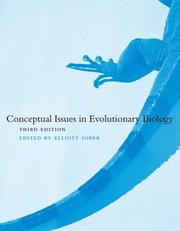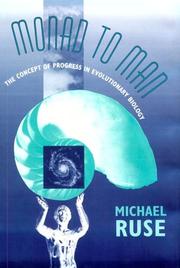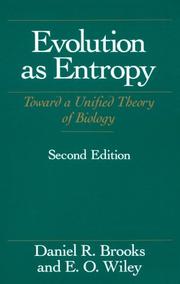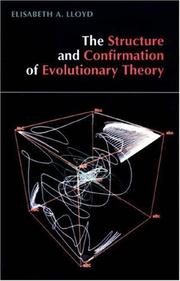| Listing 1 - 10 of 41 | << page >> |
Sort by
|
Book
ISBN: 9780226401881 9780226401744 022640174X 022640188X Year: 2016 Publisher: Chicago University of Chicago press
Abstract | Keywords | Export | Availability | Bookmark
 Loading...
Loading...Choose an application
- Reference Manager
- EndNote
- RefWorks (Direct export to RefWorks)
Evolution (Biology) --- Chance --- Philosophy --- Evolution (Biology) - Philosophy

ISBN: 0792317092 9048141532 9401580383 Year: 1992 Volume: vol 11 Publisher: Dordrecht Kluwer
Abstract | Keywords | Export | Availability | Bookmark
 Loading...
Loading...Choose an application
- Reference Manager
- EndNote
- RefWorks (Direct export to RefWorks)
Evolution. Phylogeny --- Biology --- Evolution (Biology) --- Philosophy --- Congresses. --- Congresses --- Evolution (Biology) - Philosophy - Congresses. --- Biology - Philosophy - Congresses.

ISBN: 9780262693387 9780262195492 0262693380 0262195496 Year: 2006 Publisher: Cambridge, Mass. : MIT Press,
Abstract | Keywords | Export | Availability | Bookmark
 Loading...
Loading...Choose an application
- Reference Manager
- EndNote
- RefWorks (Direct export to RefWorks)
These essays by leading scientists and philosophers address conceptual issues that arise in the theory and practice of evolutionary biology. The third edition of this widely used anthology has been substantially revised and updated. Four new sections have been added: on women in the evolutionary process, evolutionary psychology, laws in evolutionary theory, and race as social construction or biological reality. Other sections treat fitness, units of selection, adaptationism, reductionism, essentialism, species, phylogenetic inference, cultural evolution, and evolutionary ethics.Each of the twelve sections contains two or three essays that develop different views of the subject at hand. For example, the section on evolutionary psychology offers one essay by two founders of the field and another that questions its main tenets. One sign that a discipline is growing is that there are open questions, with multiple answers still in competition; the essays in this volume demonstrate that evolutionary biology and the philosophy of evolutionary biology are living, growing disciplines.
Evolution (Biology) --- Biology --- Evolution (Biologie) --- Biologie --- Philosophy. --- Philosophy --- Philosophie --- Evolution (Biology). --- Evolution (Biology) - Philosophy --- Biology - Philosophy

ISBN: 9780199267972 0199267979 9780199556717 0191708275 0199556717 9786610755103 0191533211 1280755105 1435622669 Year: 2008 Publisher: Oxford Clarendon
Abstract | Keywords | Export | Availability | Bookmark
 Loading...
Loading...Choose an application
- Reference Manager
- EndNote
- RefWorks (Direct export to RefWorks)
Evolution (Biology) --- Natural selection --- Philosophy. --- Philosophy of science --- Philosophy --- Natural selection - Philosophy --- Evolution (Biology) - Philosophy

ISBN: 0674582209 0674042999 9780674042995 9780674582200 0674032489 9780674032484 9780674032484 Year: 1996 Publisher: Cambridge, Mass. Harvard University Press
Abstract | Keywords | Export | Availability | Bookmark
 Loading...
Loading...Choose an application
- Reference Manager
- EndNote
- RefWorks (Direct export to RefWorks)
In interviews with today's major figures in evolutionary biology--including Stephen Jay Gould, E. O. Wilson, Ernst Mayr, and John Maynard Smith--Ruse offers an unparalleled account of evolutionary theory, from popular books to museums to the most complex theorizing, at a time when its status as science is under greater scrutiny than ever before.
Evolution (Biology) --- Philosophy. --- History. --- Evolution. Phylogeny --- Philosophy --- History --- Evolution (Biology) - Philosophy. --- Evolution (Biology) - History.
Book
ISBN: 9782930698397 293069839X Year: 2017 Publisher: Arquennes Memogrames
Abstract | Keywords | Export | Availability | Bookmark
 Loading...
Loading...Choose an application
- Reference Manager
- EndNote
- RefWorks (Direct export to RefWorks)

ISBN: 0226075737 0226075745 9780226075747 Year: 1988 Volume: vol *16 Publisher: Chicago Chicago Press
Abstract | Keywords | Export | Availability | Bookmark
 Loading...
Loading...Choose an application
- Reference Manager
- EndNote
- RefWorks (Direct export to RefWorks)
Evolution. Phylogeny --- Entropie --- Entropy --- Evolution (Biology) --- Entropy. --- Biology --- Philosophy. --- Philosophy --- Evolution --- Evolution - Philosophy. --- Biology - Philosophy --- Evolution (Biology) - Philosophy.

ISBN: 0691000468 9780691000466 Year: 1994 Publisher: Princeton, N.J. Princeton University Press
Abstract | Keywords | Export | Availability | Bookmark
 Loading...
Loading...Choose an application
- Reference Manager
- EndNote
- RefWorks (Direct export to RefWorks)
Philosophy of nature --- Philosophy of science --- Population genetics --- Evolution (Biology) --- Philosophy. --- Population genetics - Philosophy. --- Evolution (Biology) - Philosophy.
Book
ISBN: 2711303926 9782711303922 Year: 1990 Volume: vol *2 Publisher: Paris Editions universitaires
Abstract | Keywords | Export | Availability | Bookmark
 Loading...
Loading...Choose an application
- Reference Manager
- EndNote
- RefWorks (Direct export to RefWorks)
Evolutie --- Evolutie [Menselijke ] --- Evolution --- Evolution humaine --- Homme--Evolution --- Human evolution --- Mens--Evolutie --- Menselijke evolutie --- Evolution (Biology) --- Philosophy. --- Evolution (Biology) - Philosophy.
Book
ISBN: 9780226562261 9780226562254 0226562263 0226562255 9780226562278 0226562271 Year: 2010 Publisher: Chicago The University of Chicago Press
Abstract | Keywords | Export | Availability | Bookmark
 Loading...
Loading...Choose an application
- Reference Manager
- EndNote
- RefWorks (Direct export to RefWorks)
Life on earth is characterized by three striking phenomena that demand explanation: adaptation—the marvelous fit between organism and environment; diversity—the great variety of organisms; and complexity—the enormous intricacy of their internal structure. Natural selection explains adaptation. But what explains diversity and complexity? Daniel W. McShea and Robert N. Brandon argue that there exists in evolution a spontaneous tendency toward increased diversity and complexity, one that acts whether natural selection is present or not. They call this tendency a biological law—the Zero-Force Evolutionary Law, or ZFEL. This law unifies the principles and data of biology under a single framework and invites a reconceptualization of the field of the same sort that Newton’s First Law brought to physics. Biology’s First Law shows how the ZFEL can be applied to the study of diversity and complexity and examines its wider implications for biology. Intended for evolutionary biologists, paleontologists, and other scientists studying complex systems, and written in a concise and engaging format that speaks to students and interdisciplinary practitioners alike, this book will also find an appreciative audience in the philosophy of science.
Evolution (Biology) --- Biodiversity --- Biocomplexity --- Philosophy --- Biology --- Biodiversity. --- Biocomplexity. --- Evolution (Biologie) --- Biodiversité --- Biocomplexité --- Philosophy. --- Philosophie --- Evolution (Biology) - Philosophy
| Listing 1 - 10 of 41 | << page >> |
Sort by
|

 Search
Search Feedback
Feedback About UniCat
About UniCat  Help
Help News
News